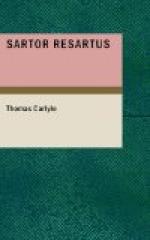It were a piece of vain flattery to pretend that this Work on Clothes entirely contents us; that it is not, like all works of genius, like the very Sun, which, though the highest published creation, or work of genius, has nevertheless black spots and troubled nebulosities amid its effulgence,—a mixture of insight, inspiration, with dulness, double-vision, and even utter blindness.
Without committing ourselves to those enthusiastic praises and prophesyings of the Weissnichtwo’sche Anzeiger, we admitted that the Book had in a high degree excited us to self-activity, which is the best effect of any book; that it had even operated changes in our way of thought; nay, that it promised to prove, as it were, the opening of a new mine-shaft, wherein the whole world of Speculation might henceforth dig to unknown depths. More specially may it now be declared that Professor Teufelsdrockh’s acquirements, patience of research, philosophic and even poetic vigor, are here made indisputably manifest; and unhappily no less his prolixity and tortuosity and manifold ineptitude; that, on the whole, as in opening new mine-shafts is not unreasonable, there is much rubbish in his Book, though likewise specimens of almost invaluable ore. A paramount popularity in England we cannot promise him. Apart from the choice of such a topic as Clothes, too often the manner of treating it betokens in the Author a rusticity and academic seclusion, unblamable, indeed inevitable in a German, but fatal to his success with our public.
Of good society Teufelsdrockh appears to have seen little, or has mostly forgotten what he saw. He speaks out with a strange plainness; calls many things by their mere dictionary names. To him the Upholsterer is no Pontiff, neither is any Drawing-room a Temple, were it never so begilt and overhung: “a whole immensity of Brussels carpets, and pier-glasses, and ormolu,” as he himself expresses it, “cannot hide from me that such Drawing-room is simply a section of Infinite Space, where so many God-created Souls do for the time meet together.” To Teufelsdrockh the highest Duchess is respectable, is venerable; but nowise for her pearl bracelets and Malines laces: in his eyes, the star of a Lord is little less and little more than the broad button of Birmingham spelter in a Clown’s smock; “each is an implement,” he says, “in its kind; a tag for hooking-together; and, for the rest, was dug from the earth, and hammered on a stithy before smith’s fingers.” Thus does the Professor look in men’s faces with a strange impartiality, a strange scientific freedom; like a man unversed in the higher circles, like a man dropped thither from the Moon. Rightly considered, it is in this peculiarity, running through his whole system of thought, that all these shortcomings, over-shootings, and multiform perversities, take rise: if indeed they have not a second source, also natural enough, in his Transcendental Philosophies, and humor of looking at all Matter and Material things as Spirit; whereby truly his case were but the more hopeless, the more lamentable.




